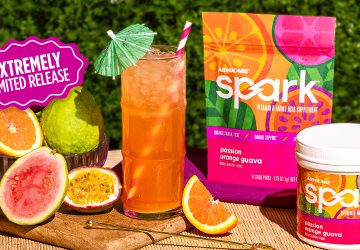
In the realm of gut health, the trifecta of prebiotics, probiotics, and postbiotics has emerged as a beacon of wellness. These vital components, working together in harmony, offer a treasure trove of benefits that extend far beyond just digestive health. Let’s dive into the five transformative aspects we love about Synbiotic Ultra™.
#1) Gut Microbiome Synergy
Synbiotic Ultra™, like AdvoCare Harmony™, presents a synergistic blend of prebiotic, probiotics and postbiotic to foster optimal gut health and overall wellness.
- Formulated with 250 milligrams of inulin fiber (prebiotic) sourced from Jerusalem artichoke, it promotes the growth of probiotics, enhancing beneficial bacteria in the gut.
- The 8 different strains of Probiotics thrive on the unique combination of prebiotics and postbiotics, which create a diverse gut microbiome. This ecosystem supports efficient digestion, aids in nutrient absorption, and helps maintain a healthy gut environment.
- The Beta-glucan serves as postbiotic, enhances microbiota composition in the gut, contributing to the well-being of beneficial gut bacteria, i.e., a happy gut.
#2) Enhanced Digestive Health
The symbiotic relationship between prebiotics, probiotics and postbiotics significantly contributes to digestive wellness. Prebiotics foster the growth of probiotics, ensuring their survival and activity in the gut. This cooperative action aids in alleviating symptoms of occasional gastrointestinal discomfort, such as constipation or infrequent diarrhea, by promoting regular bowel movements and restoring gut flora balance.
#3) Immune Health Support
Did you know that 70% of the immune system is located in the gut? Your gut plays a pivotal role in your overall immune health. Synbiotic Ultra™’s formulation, featuring prebiotics like inulin, improves metabolic function and helps to regulate intestinal immunity. (Sheng et al 2023) Meanwhile, probiotics directly interact with the gut-associated immune cells, enhancing their activity and helping to fortify the body’s defense mechanisms against infections and diseases (Shinde and Perera, 2021).
#4) Postbiotics step things up
Beta-glucans, a type of postbiotic, have gained attention for their beneficial properties concerning immune and gut health. These soluble fibers, derived from the cell walls of plants, yeast and bacteria strengthen the intestinal barrier, promote gut immune health, and even show potential in supporting cardiovascular health (Zou et al., 2020).
#5) Delayed release capsule delivery system
The delayed release capsule in Synbiotic Ultra™ ensures the viable transportation of good bacteria make it to their destination in the gut for colonization. This protective delivery system shields probiotics from the acidic environment of the stomach. Without protection, probiotics have a small chance of reaching the intestinal tract intact and delivering their beneficial effects.

While the benefits of the prebiotic, probiotic and postbiotic trio in Synbiotic Ultra™ are substantial, individual responses may vary. We always recommend consulting a healthcare professional before making significant changes to your healthcare program.
References:
Holscher, H.D. (2017). Dietary fiber and prebiotics and the gastrointestinal microbiota. Gut Microbes, 8(2), 172–184.
Valcheva, R. et al. (2019). Prebiotics and probiotics for maintenance of remission in ulcerative colitis: A randomized controlled pilot study. European Journal of Nutrition, 58(2), 207–217.
Shinde, T. and Perera, A.P. (2021). Prebiotics, Probiotics, Synbiotics, and Postbiotics in Inflammatory Bowel Disease: State-of-the-Art and New Insights. Journal of Inflammation Research, 14, 3255–3272.
Zou, Y. et al. (2020). Postbiotics: Definitions and Applications in Human Health. BMJ Open Gastroenterology, 7(1), e000992.
Tillisch, K. (2014). The effects of gut microbiota on CNS function in humans. Gut Microbes, 5(3), 404–410.
Sheng, W., Ji, G., & Zhang, L. (2023). Immunomodulatory effects of inulin and its intestinal metabolites. Frontiers in immunology, 14, 1224092.

Lauren Horton, PhD.
Dr. Lauren Horton is passionate about moving patient care forward through research. As a Division Research Director, she is at the forefront of groundbreaking studies and innovation. Her dedication to advancing knowledge and solving complex problems has led to her pivotal role in shaping the future of patient care in the healthcare industry.
Dr. Horton leverages her deep insights and knack for communicating complex ideas in an accessible way to educate and engage a global audience. In her spare time, she is an avid advocate for health and wellness, dedicated to making a positive impact on the world. She believes that knowledge is a powerful tool for change and strives to empower others with the information and inspiration needed to effect meaningful transformation.
Dr. Horton loves to help improve the quality of life of those around her. She has helped men and women from all over the country discover how small steps each day can lead to huge strides towards living a healthier lifestyle.
Dr. Horton holds a BS in biology from Rust College, a MS in health economics and outcomes research from Xavier University and a PhD in biomedical science from Morehouse School of Medicine and completed her post-doctoral studies at the University of Pennsylvania.




